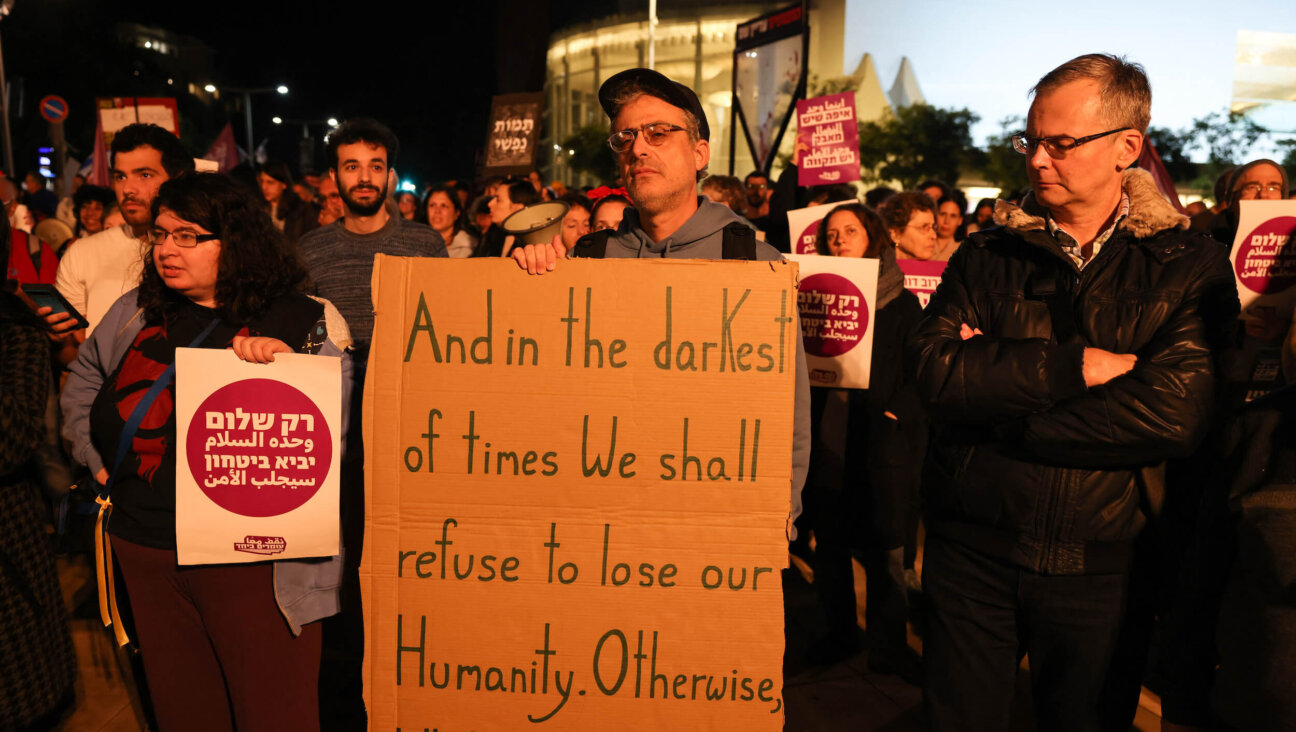The hostage murders are a wake-up call: U.S. officials must stop enabling Netanyahu
Biden has been claiming, for months, that a ceasefire deal is close. But his administration’s approach clearly isn’t working

A protester holds a sign saying “Biden helps. BB kills them” at a Sept. 1 demonstration in Jerusalem for the release of the hostages, following the news of the murder of six hostages held by Hamas. Photo by Yahel Gazit / Middle East Images / Middle East Images via AFP
When asked Monday whether he thinks Israeli Prime Minister Benjamin Netanyahu is doing enough to reach a ceasefire, President Joe Biden had a curt response: “No.”
Which raises a challenging question: What is Biden prepared to do about it?
Hamas’ murder of six hostages, discovered over the weekend, made it clear that those in power in the United States are failing to provide sufficient support for the people, Israeli and Palestinian alike, whom they are ostensibly trying to help. U.S. officials responded by rightfully condemning Hamas — but only Hamas. Yet in Israel, it’s Prime Minister Benjamin Netanyahu who is subject to the vast surge of outrage, with tens of thousands of people taking to the street to urge him to finally agree to a deal.
To those protesters, the fate of those six hostages — and the dozens who remain alive in captivity — is as much a result of Netanyahu’s decision-making as Hamas’ violence.
One group of hostage families noted that, per reporting from the Israeli outlet Yediot Aharonot, Hamas had agreed to the release of three of the hostages in a deal that “could have been approved on July 2” — a deal that Netanyahu has been accused of deliberately attempting to scuttle. U.S. officials increasingly doubt Netanyahu’s “stated intentions” to reach a deal, suggesting that his priority is not to bring home the hostages, but to extend the war.
The hostage families and the many thousands of people protesting their own government are trying to use the sole resource at their disposal — public pressure — to get Netanyahu to reach a deal.
But while the Israeli public and American political establishment may both be outraged, only one of them is stressing that Netanyahu holds responsibility, and exerting pressure to compel him to change course — and it’s not the Americans, who have far greater leverage over Netanyahu than the public he purportedly serves.
Both Biden and Vice President Kamala Harris’ statements on the tragic murders rightfully blamed Hamas, but failed to note the impact of the roadblocks Netanyahu has consistently thrown up to avoid securing a deal. And this isn’t new: for weeks, U.S. officials have been buttering Netanyahu up, rather than holding him to account. In August, weeks after a senior Israeli official involved in negotiations told Israeli media that Netanyahu was delaying an agreement by introducing new demands, Secretary of State Antony Blinken said Netanyahu had “confirmed to me that Israel supports the bridging proposal. The next important step is for Hamas to say ‘yes.’”
It was as if there were no good reasons to suspect that Netanyahu is telling the U.S. what it wants to hear — while continuing to do all he can to ensure the war drags on. U.S. leaders might think that by going easy on Netanyahu in public, they’re smoothing the way for him to actually, finally cooperate. But they should know by now that the only way to make him change his course is to make him face actual consequences for his actions.
This is not to defend or excuse Hamas, which orchestrated the horrific attack of Oct. 7 and is holding innocent people taken hostage that day as bargaining chips. But it is to say that the line that Hamas alone is responsible for the lack of a ceasefire deal is not just untrue, but damaging.
Yet the Biden administration has essentially stayed its course, despite it being clear that Netanyahu has no intention of agreeing to the ceasefire proposal that the U.S. laid out months ago. As he has delayed, thousands of Palestinians have been killed by Israel; now several Israeli hostages have been killed by Hamas. What the Biden administration has been doing isn’t working. And if what they’re doing isn’t working and they do not change their behavior, then they are resigning themselves to failure — and effectively abandoning the hundreds of thousands of Israelis and Palestinians who are demanding change.
I do not doubt that Biden is sincere in his desire to bring the hostages home. But Netanyahu’s pattern of finding infinite new quibbles to avoid signing a deal has made it very clear that Biden cannot manifest a hostage exchange simply by insisting, as he has for three months, that one is close.
If anything, that pattern has become more pronounced since the six hostages’ murders. In the wake of the discovery of their deaths, Netanyahu chose to declare that Israel wouldn’t let go of its non-starter demand to retain control of Gaza’s border with Egypt, even if that stance had dire consequences for hostages. In fact, he argued the murders showed that Israel needs to keep fighting — not seek peace.
“He is going to use the murder of my cousin in order to keep the war going,” Gil Dickmann, a cousin of the murdered hostage Carmel Gat, told CNN. “I’m furious. It’s exactly what he does. It’s his responsibility that they were killed.”
What levers could the Biden administration pull to try and force Netanyahu’s hand — and show it hears and acknowledges the extraordinary rage that Israelis feel toward their leader?
In addition to continuing to name Netanyahu and his government as responsible for delaying a ceasefire, U.S. officials could work to hold Netanyahu accountable under international law by supporting independent inquiries into the war in Gaza, including over the death of aid workers. It could stop slamming the International Criminal Court for seeking the Israeli prime minister’s arrest. It could even follow the lead of the United Kingdom and suspend some arms sales to Israel.
So long as Biden will only criticize Netanyahu cautiously — and refuse to exert any stronger pressure — our role is that of enabler, helping Netanyahu to push off a ceasefire even while stating that we’re working toward one.
















